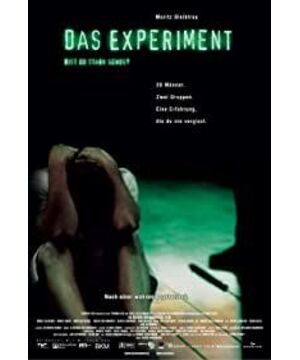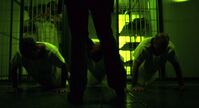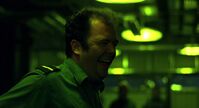This past year has been afraid to look like a movie
perhaps because they like to go to school that would
go to school themselves
whether watching movies or how much life has meant less investment spectator
of course how much will be less fun
after graduation, but the work gradually he found himself more and more easy to put
movies and TV shows empathy is also much
less share the joy and fun of the spectator
side of the treadmill while watching the evening of this classic film behaviorist experiments
to see the German version of the old
still did not Controlling it, wondering
if I were the experimenter, would I end up when there was already turmoil the next day?
If I were a jailer, would I also form my own rights to protect my position and face in the experiment? Even revenge?
If I were a prisoner, would I be obedient and not rebellious or would I still treat it as a hippie smiling face like a game?
I don’t dare to think about it.
Even the game.
Maybe we are still obsessed with our identity.
Even the game.
Maybe some people desperately want to win. Be the boss.
Even the game.
Maybe there will be casualties and
deaths. I don’t know about the experiment. How did you choose the
person? Of course, everyone has a distinct personality
. When the person in the game is too addicted to his identity in the game, he
forgets that the
murder is illegal,
and the person he faces is not a criminal
but a passerby. Once acquainted
Never use human nature as an experiment. I can’t afford to lose
. At the beginning, the evil nature
is against the Confucian culture of our country,
but I always feel that there is always a little bit of violence in my bones and blood
. Every prison in the experiment symbolizes the power and the
jailer will master With more and more power and control, prisoners will gradually lose all power.
This also brings out the most evil side of human nature. This is all because of power, domination, and control.
This experiment is about role-playing, anonymous psychology, and dehumanization.
There is also a spirit of cooperation in this, and the feelings of colleagues will arise between the jailers.
Many bad things happen not directly from evil motives, but from being encouraged by others to cooperate together.
The most important thing is the spread of responsibility.
If a person feels that he is not responsible for a certain thing, he feels that I am not responsible. I am just playing a role and executing orders. You will allow yourself to do something you thought you would never do. .
Is when interviewed Professor Zimbardo said about some of the theory of this experiment
suddenly reminds me of some of the many problems caused by domestic power concentrated
so that we have no right to such people who
only obey before they can survive
not have It’s the same to think that you can’t make a sound
. Let
’s show you the classic psychology experiment.
In 1971, Philip Zimbardo, a professor of psychology, designed the Stanford simulated prison experiment, which was completed by 24 randomly selected Stanford University students as simulated jailers and simulated prisoners in a temporary reformed "prison" at the school. The experiment was originally planned to last for two weeks. By the second day of the experiment, the "jailers" were no longer satisfied with just keeping the "prisoners" in their cells. The same horrible thing happened in Abu Gheb City (Baghdad Central Prison) in this mock prison: the prisoners were stripped naked, with paper bags on their heads, and they were also subjected to sexual abuse. The experiment, which was supposed to last for two weeks, had to be terminated six days after it started. Professor Zimbardo described in detail the ins and outs of this story in his new book "The Lucifer Effect: How Good People Become Bad People" "
Stanford Prison Experiment", which strongly demonstrates the role of situation (Zimbardo , 1971). Not only that, but this experiment also provided inspiration for a novel, two movies, countless TV shows, and even a band, and even the law was revised for this. We'll talk about these later, let's take a look at this experiment first. The idea of the
prisoners and prison guards
experiment is simple: to see how the healthiest and most "normal" selected ordinary people respond to a radical change in their normal status. Half of the subjects acted as prison guards and the other half as prisoners. There is no compromise in this experiment, because in order for the experiment to have a good effect, the experience of prisoners and prison guards in real life must be realistically simulated. These subjects have to welcome a new experience in life.
The "prisoners" were "arrested" by police cars wailing the alarm when they went out early in the morning as usual. They were then fingerprinted, blindfolded, and imprisoned. He was stripped naked, searched, lice, haircut, prison uniform, a number, and a chain tied to one foot.
The other subjects became prison guards wearing police uniforms and holding wooden sticks. The basement of a building at Stanford University was disguised as a prison.
Thus, the experiment began.
Rebellion was suppressed
Everything was normal at first, but on the second day, the "prisoners" resisted being imprisoned. The prison guards retaliated quickly and cruelly. They stripped the prisoner naked, moved the prisoner's bed, dragged the leader of the resistance to confinement, and began to harass the "prisoner".
Soon after, the "prisoners" began to obey the guards unconditionally. After just a few days of realistic role-playing, the subjects reported that their previous identities seemed to have been completely erased. They became their numbers in prison. The same situation happened to the "prison guards" who abused and abused their prisoners.
The experimenters were also involved in their own experiments.
Even the lead researcher Philip Zimbardo (Philip Zimbardo) admitted that he was immersed in the role of "prison director". In fact, Zimbardo believes that the most effective result of this experiment is that he has been transformed into an image of a character who pays more attention to the system-paying more attention to the security of the prison rather than the welfare of the subjects.
The other members of the experimental group are also engrossed in their new roles. Craig Haney, like Zimbardo, explained that he was completely busy with the daily crises in managing the "prison", and forgot what the purpose of their experiment was.
The role-playing
experiment was not finally stopped until one of his colleagues intervened. The experiment is expected to take 14 days, but only lasted 6 days in total. Young people who used to be pacifists insulted and physically attacked "prisoners" in the process of being a prison guard. There were even reports that some people enjoyed the process. At the same time, the "prisoners" quickly showed signs of typical emotional breakdown. Five of them had to leave the "prison" even before the experiment ended early.
The psychological explanation for the subjects’ behavior is that they have assumed their assigned social roles. This includes accepting the implicit social standards associated with these roles: prison guards should become dictatorial, they should torture prisoners, and prisoners need to endure their own punishment in a humble manner.
This experiment inevitably drew criticisms against morality, including small samples and lack of ecological effectiveness. Nevertheless, it is still difficult to deny that this experiment provides important insights into human behavior. Perhaps it can help explain the abuse in such a situation as in Abu Ghraib prison (located in Iraq, where many prisoner abuse photos were exposed after the United States launched the Iraq War). . Does the
Rikers Island Detention Center
experiment reflect the reality of prison conditions? Probably. While writing "Inside Rikers: Stories from the World's Largest Penal Colony", Jennifer Wynn interviewed the prison guards at Rikers Island, the largest detention facility in New York. A police chief explained that it is easy for prison guards to get used to the level of violence against detainees-this is part of their job and they are quickly immune to it. Some people cannot understand how they seem to be a different person when they work.
In one unit called the "Central Criminal Law Isolation Unit", the violence against prisoners was so severe that in 1995, nearly 12 prison guards were formally prosecuted for attacking prisoners. In the end, the prisoners received $1.6 million in compensation. This is just one example. The study of
popular culture and the Stanford prison experiment
is so famous today that it has even entered our popular culture. It inspired a novel-"Das Experiment" by Mario Giordano, which was later made into a movie. And a new film by the author of "The Usual Suspect" is already expected to start shooting. The experiment has also been reported and reproduced in countless TV shows, the most famous being filmed by the BBC.
Not only that, it even inspired the name of a band. The "Stanford Prison Experiment" band released their own album of the same name in 1994, and released their second album "The Gato Hunch" a year later. What other psychological experiments can say that there is a band whose name is based on yourself? The examination is a large collection of
reference
books Zimbardo, PG (1972). The Stanford Prison Experiment a Simulation Study of the Psychology of Imprisonment. Philip G. Zimbardo, Inc.
View more about The Experiment reviews











